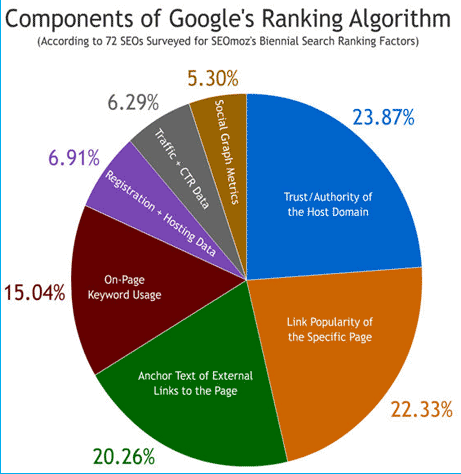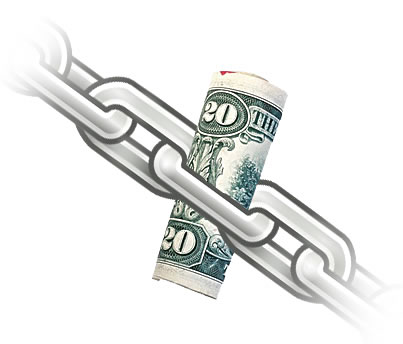A guide on Link Building
Link building has been one of the leading factors in SEO now. Gone are those days, when webmasters could flood their website with links (and not to forget, irrelevant and useless links) and still, see their websites reaching the apex of the SERPs. Due to this nonsense spreading all over the web, Google had to use its punishment wand. Hence, it came out with the Google Penguin update and started penalizing sites with spammy links. With the introduction of this update, webmasters started understanding the relevance of link building in their SEO campaign. The ever changing landscape of SEO and link building has all the more increased the need for building high quality backlinks
Search engines treat links as ‘votes’ for determining the relevance and popularity of websites. In the journey of crawlers all over the web, links are nothing but the streets and paths between the pages.
Let’s understand what is link building.
A word on Link building
Source: cdn6.fedobe
Well, there is no technical definition to this term.
If you ask my interpretation of the same, it is simply doing your best to get good quality sites to link to you. It can also be understood as a proven marketing tactic to help increase your brand visibility and promotion.
And now, if you want a more standardised definition, it somewhat goes like this:
Link building is a process of acquiring hyperlinks from high quality and good websites. Hyperlinks, you may ask? They are simply, links which help the users and the search engine crawlers to navigate between the pages on the web. Many SEOs agree that link building forms one of the hardest and time consuming parts in the SEO campaign and not to forget, a recent survey revealed that 80% of the companies engaged in SEO spend more than $1,000 every month for link building.
Needles to say, if you can master this art of building good quality links, it can help you to excel over your competitors.
How do search engines perceive these link?
Links are useful for search engines in two ways:
- They help search engines to discover new pages.
- They help in determining which pages should rank in the SERPs.
You may ask how? On crawling the plethora of pages over the web, search engines extract their respective content and subsequently add them to its index. In this process, they also determine if the page has the required quality to rank for a particular keyword.
So, the jist of this is that they don’t look at the content alone, but also at the number of links pointing to that page from external websites and the qualities of these websites as well. Other factors remaining constant, the more the number of high quality websites linking to you, the greater is the chance of your website ranking in the search results.
Importance of Link building in the SEO game
As we discussed above, search engines give due importance to links pointing at your website for determining the ranks over SERPs (22.23%, as can be seen from the image below). I guess this reason is important enough for you to start building your SEO campaign already.
Here are a few more points to help justify the need to start building qualitative links:
- Link building improves Search Visibility
Let me start with a video of Matt Cutts justifying the above statement :
NCY30WhI2og
As he puts it, links form a “really really” important part of Google’s algorithm to display quality, valuable and relevant search results for a particular query.
Therefore, it is very clear that links are an important ranking signal within search results. Building more quality and highly valued links still remains the best way to get visibility and noticed on the SERPs.
- Link building helps to improve Brand exposure
Similar to other online marketing activities, link building also helps in promoting your brand, product or business to targeted audience. People essentially trust links and makes positive association with your website when a trusted website links to you. This is the reason Google use links as the core of their ranking algorithm, because links (naturally created) act as a vote of confidence from one site to another (and the best place for getting those votes are relevant websites that belong to your industry). So, manual link building would entail finding targeted websites and getting them to link to you. These links would convey positive message or signal, improving your brand’s exposure to untapped audiences.
- Link building complements other online marketing activities
Link building is hard work which requires interpersonal social skills, persuasiveness and experience. Not to forget, link building is never a stand alone activity. It has to be complemented with other online marketing activities. To put it simply, link building is not possible if there is nothing in the website worth linking to. These things include rich content, a strong social media presence, good industrial relations, a unique business value etc.
- Link building helps in building and nurturing relationships
Link building essentially involves outreaching key influential webmasters and bloggers in your industry for the purpose of promoting your website’s content, product or business and asking them to link to you. In this process, you are also building long term relationships with the important people and webmasters in your industry. These relationships, in turn can also help you in being regarded as trusted and authoritative.
- Link building can help in sending referral traffic
A link from a highly visited and popular website can help in sending relevant traffic to your website. This point is not about SEO, but is about customers which are equally important.
Types of links:
- Natural links: These links are blessings in disguise for the SEOs. These are the links which you didn’t ask for, but instead were editorially given by the webmasters. This is so much better than actually reaching out to the webmasters and asking them or rather, requesting them to link to you. Although, you need to give a strong reason to those webmasters to do the same. An example of such reason would include creating a great piece of content and spreading awareness amongst the other influential bloggers about the same. These types of links are hard to acquire and this is the reason that Google gives a high value to such types of links.
- Manual “outreach” links: This is the most common type of link building, that you, as an SEO person would perform. This essentially involves communicating and reaching out to the other webmasters and asking them to link to you. Yet, again, you are required to give a strong reason to them to link to you. This is a more common practise for those websites which are small, have recently started or are not very popular. I would advise you to contact only those websites which are relevant and connected to the kind of business you are in.
- Self created, non editorial links: I strongly recommend to not use these links as Google have started counting these as black-hat SEO, attempting to fool the search engines into believing that a particular content is relevant, where it is not. A few examples of such links would be a press release optimized for press release, embedded widgets, advertorials etc.
Are your backlinks matching these metrics to qualify themselves as ‘good links’?
Webmasters, for long have been stuck with deciding about the metrics which would help them judge the value of a backlink, whether it is worth pursuing etc. Few link building techniques:
- PageRank: PageRank is a method employed by Google to judge the relevance and authority of a page. It is measure on a scale of 0-10 with, 10 being the highest. This metric is a good way of judging the authority of the website/webpage from where the backlink is coming. I would advise you to go for only those backlinks which have a PageRank of at least 4.
Quick note: Use PageRank extension for Chrome for finding the PageRank of a page. - Anchor text: Anchor text is nothing but the hyperlinked text in blue. These give Google the indication of the subject matter of the page being linked to. Anchor texts forms one of the strongest signals in the ranking algorithms. If a lot of relevant links are pointing to a web page with right and different anchor texts, that web page is likely to rank for the targeted keyword in the anchor text.
- Popularity: The more relevant, authoritative and popular the site is, the more desired are the links from that site. An example of such site is Wikipedia, which has millions of diverse sites linking to it. To earn the trust of search engines and users, backlinks from these websites can really help you.
- Link Neighbourhood: If a website is linking to a spammy site or a spammy site is linking to a website, that website will also be counted as a spam. These links, in aggregate is called a ‘link neighbourhood’. You should ensure that you are in a good/safe link neighbourhood and take equal care that the website you are linking to, as well have a good link neighbourhood.
- Trusted domains: There is a lot of spam out there on the web. In order to screen out all the irrelevant content, search engines use certain algorithms for measuring their trust. Getting links from highly trusted domains like .org, .edu etc can really help you.
Are all links created equal?
Well, imagine if you are a newly established news website, and you get 3 backlinks:
- From New York Times
- From a blogging website that writes only about movie news
- From a website that sells coffee
Do you really think, each of these backlinks are giving you the same SEO value?
No is an obvious answer to the above question.
In fact, the third website is not even relevant to your industry; having backlinks from such unrelated websites will definitely do no good to you.
Amongst the remaining two websites, a backlink from New York Times is more valuable to you than from the other site. Wondering why? Recall the metrics that were discussed in the section above. New york times is a more popular, relevant and trusted website.
So, the bottom line is that backlinks from relevant, related, diverse, trusted, popular and
authoritative websites are of a greater value.
Paid links! A topic more known and less understood
Source: Seomastering
“Paid links is something, that Google is totally against for”. Do you also think the same?
Well, let me tell you that there are some paid links that Google loves. Shocked?
First, let’s listen the Man of Google explain what are paid links:
zupIbMyMfBI
The whole story of paid links is much more complicated.
Here are Google’s webmaster guidelines on the same:
“Buying or selling links that pass PageRank is in violation of Google’s Webmaster Guidelines and can negatively impact a site’s ranking in search results.”
They then, point out:
“Not all paid links violate our guidelines. Buying and selling links is a normal part of the economy of the web when done for advertising purposes, and not for manipulation of search results”
Heard about Yahoo Directory listings? It is a human reviewed directory and is valued highly in the eyes of Google. Being listed here costs $299 a year. But a link from this directory can really help you grow your SEO value.
Similarly, there are some industry directories where, if you get listed (even if it’s paid) can have a positive impact on your SEO. Thomasnet is one such example.
So, we see that not all paid links are bad.
How long will it take for a site to rank after the link building campaign?
It takes a good amount of time for link building to have a positive impact on your SEO and thus, rankings. This time varies from one website to another and depends on number of factors like:
- The competitive level of your industry
- The competitive level of your targeted keywords
- The pace at which your competitors are building their links
- The strength of your domain
It can therefore take, from days to months to see an increase in your rankings. Link building is never a one-time activity, but is rather an ongoing activity which requires constant effort coupled with other initiatives like great content creation, social media involvement etc.





Share Your Thoughts